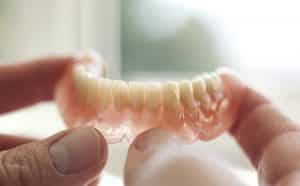 You’ve got quite a lot to consider when it comes to making selections for your smile. You want to provide your teeth and gums the best care you can muster up but when you’re not sure how to make that happen, you may feel yourself floundering. Fortunately, you just need some gentle guidance regarding how to keep your oral health safe with your selections. As for who you should visit for professional treatments, well … we think we have a good suggestion for you.
You’ve got quite a lot to consider when it comes to making selections for your smile. You want to provide your teeth and gums the best care you can muster up but when you’re not sure how to make that happen, you may feel yourself floundering. Fortunately, you just need some gentle guidance regarding how to keep your oral health safe with your selections. As for who you should visit for professional treatments, well … we think we have a good suggestion for you.
Quiz: Environmentally Friendly Oral Health
 What you want is an environmentally friendly oral health approach. What you’re worried you’re going to get is a lot of obstacles to keeping your smile clean and safe, while adhering to your dedication to sustainability. Fortunately, you do not have to pick one or the other. Consider the help of a quick quiz to learn more about how you can choose to protect both your feelings about green living and your ability to keep teeth and gums healthy.
What you want is an environmentally friendly oral health approach. What you’re worried you’re going to get is a lot of obstacles to keeping your smile clean and safe, while adhering to your dedication to sustainability. Fortunately, you do not have to pick one or the other. Consider the help of a quick quiz to learn more about how you can choose to protect both your feelings about green living and your ability to keep teeth and gums healthy.
Which Fruits Are Better For My Smile?
 You know that no matter what, if you decide to eat fruit (which is very good for your body, of course), it’s packed with natural sugars. While it’s true that they are natural, that doesn’t mean that they aren’t going to contribute to tooth decay. What you should take into consideration, as well, is that you don’t necessarily want to be eating fruit on a consistent basis that is also very acidic. Didn’t realize you had a choice? Let’s review some good guys (and bad guys) and what you can do to make sure you have the chance to enjoy everything you love.
You know that no matter what, if you decide to eat fruit (which is very good for your body, of course), it’s packed with natural sugars. While it’s true that they are natural, that doesn’t mean that they aren’t going to contribute to tooth decay. What you should take into consideration, as well, is that you don’t necessarily want to be eating fruit on a consistent basis that is also very acidic. Didn’t realize you had a choice? Let’s review some good guys (and bad guys) and what you can do to make sure you have the chance to enjoy everything you love.
Spring Gardening: Organics 101
 Have you been trying your hand at home gardening but wish your thumb could magically become a bit greener? If so, you may find just what you need with this upcoming Spring Gardening: Organics 101 event. Clear a bit of time in your schedule, so you don’t miss out!
Have you been trying your hand at home gardening but wish your thumb could magically become a bit greener? If so, you may find just what you need with this upcoming Spring Gardening: Organics 101 event. Clear a bit of time in your schedule, so you don’t miss out!
Quiz: How Many Teeth?
 You very well may have a quick answer to a long list of questions about your smile. Details about prevention? You know it. Stuff about what to do when you end up with a cavity? You’re right there with a solution. However, if someone were to ask you about how many permanent teeth you have, you just might have to stop and count! Let’s have a bit of fun and test your knowledge of just how many teeth are in there!
You very well may have a quick answer to a long list of questions about your smile. Details about prevention? You know it. Stuff about what to do when you end up with a cavity? You’re right there with a solution. However, if someone were to ask you about how many permanent teeth you have, you just might have to stop and count! Let’s have a bit of fun and test your knowledge of just how many teeth are in there!
Fluoride And Your Child’s Smile
 You might have a general sense that fluoride offers protection against tooth decay. However, that doesn’t mean you feel like you’ve got all your facts lined out when it comes to fluoride and your child’s smile. We are happy that you are inquisitive and interested in going the extra mile to protect your little one’s oral health. As a result, we offer up a few helpful specifics, so you know how to move forward.
You might have a general sense that fluoride offers protection against tooth decay. However, that doesn’t mean you feel like you’ve got all your facts lined out when it comes to fluoride and your child’s smile. We are happy that you are inquisitive and interested in going the extra mile to protect your little one’s oral health. As a result, we offer up a few helpful specifics, so you know how to move forward.
Improving Denture Stability
 If you have full or partial dentures, you may have experienced some minor concerns with stability over the course of your wear. While they help you eat and speak with ease, they can also cause you to have an occasional moment of worry when they feel like they’re slipping. Fortunately, we have some helpful advice for making sure they stay in place, so you can enjoy life without stressing about your smile.
If you have full or partial dentures, you may have experienced some minor concerns with stability over the course of your wear. While they help you eat and speak with ease, they can also cause you to have an occasional moment of worry when they feel like they’re slipping. Fortunately, we have some helpful advice for making sure they stay in place, so you can enjoy life without stressing about your smile.
Dental Checkups FAQs
 Are you someone who knows all that there is to know about dental checkups? Are you certain about how frequently to see us, why it’s so important that we see you, and what you can really expect to get out of keeping up with your preventive care? If not, you probably have some questions that have been taking up space in your brain. Why not let them out and feel confident about your dental care? Let’s help you get started with some FAQs!
Are you someone who knows all that there is to know about dental checkups? Are you certain about how frequently to see us, why it’s so important that we see you, and what you can really expect to get out of keeping up with your preventive care? If not, you probably have some questions that have been taking up space in your brain. Why not let them out and feel confident about your dental care? Let’s help you get started with some FAQs!
Porcelain Veneers: All The Many Benefits
 What do you really know about how porcelain veneers can benefit your smile? Are you aware that they can provide you with a smile makeover but you don’t really know much more than that? If so, you are in for a surprise! The more you learn about the advantages that will come your way if you choose veneers, the more you will have to smile about!
What do you really know about how porcelain veneers can benefit your smile? Are you aware that they can provide you with a smile makeover but you don’t really know much more than that? If so, you are in for a surprise! The more you learn about the advantages that will come your way if you choose veneers, the more you will have to smile about!
Little Tiny Spaces: How To Deal
 Are you troubled by your smile because of little spaces? Perhaps you have a tiny gap between two teeth that you wish you could fix, so your smile looked lovelier. Maybe you have a few spaces that drive you crazy in part because you find them unsightly and also because when you eat, food often gets stuck in there. When you’re not dealing with an allover misalignment concern but you are tired of these spaces, we can help you with cosmetic dentistry.
Are you troubled by your smile because of little spaces? Perhaps you have a tiny gap between two teeth that you wish you could fix, so your smile looked lovelier. Maybe you have a few spaces that drive you crazy in part because you find them unsightly and also because when you eat, food often gets stuck in there. When you’re not dealing with an allover misalignment concern but you are tired of these spaces, we can help you with cosmetic dentistry.







